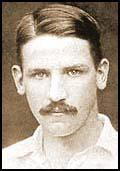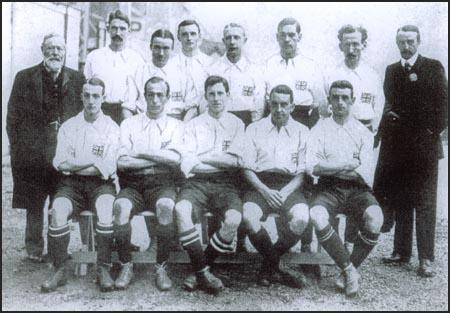Kenneth Hunt

Kenneth Reginald Gunnery Hunt was born in Oxford on 24th February, 1884. While studying for a degree he played football for Oxford University. Later he played for the Corinthians.
In 1906 he signed for Wolverhampton Wanderers in the Second Division of the Football League as an amateur.
The following season Wolves enjoyed a good run in the FA Cup. They beat Bury (2-0), Swindon Town (2-0), Stoke City (1-0) and Southampton (2-0) to reach the final against Newcastle United. Newcastle had just finished 4th in the First Division during this season, and after two successive league titles they were hot favourites to win the cup against their Second Division opponents. It was also Newcastle's third FA Cup final appearance in 4 years.
Newcastle United had the vast majority of the possession but couldn't penetrate the Wolves defence. After 40 minutes a poor clearance went straight to Hunt. Jim Lawrence, the Newcastle goalkeeper, got a hand the Hunt's tremendous shot and could not keep it out of the net. Soon afterwards George Hedley scored a second. In the second-half, Newcastle's constant pressure resulted in a goal for Jimmy Howie. Just before the end, Wolves broke away and Billy Harrison added a third.
Hunt remained an amateur player and played his first game for England against Italy in 1907. He was also selected to play for England in the 1908 Olympic Games in London. Also in the team was Vivian Woodward of Tottenham Hotspur and Harry Stapley of West Ham United. Woodward was captain of the England team that beat Sweden (12-1) and Holland (4-0) to reach the final against Denmark. England won the gold medal by beating Denmark 2-0 on 24th October, 1908.

is in the centre of the front row. Harry Stapley is sitting to Woodward's right.
William McGregor is standing on the left with Kenneth Hunt next to him.
In 1909, Hunt was ordained as a Church of England vicar. He also taught at Highgate School. Hunt continued to play football and on 13th March 1911 he won his first full international cap for England against Wales. The England team included Bob Crompton, Jesse Pennington, Jock Simpson, George Webb, William Wedlock and Vivian Woodward. England won 3-0.
Billy Meredith, who played in the game later claimed that "I never ran up against a harder or fitter half-back. It was like running up against a brick wall when he charged you... His positioning was perfect. He seldom allowed you a yard of room in which to work. I'm glad I didn't have to meet him very often."
Hunt played in 50 games for Wolverhampton Wanderers. He also played for Leyton in the Southern League. Charlie Buchan also played for the club in the 1910-11 season. In his autobiography, A Lifetime in Football, Buchan pointed out that Hunt: "The big, strong cleric was noted for his vigorous charging. He delighted in an honest shoulder charge, delivered with all the might of his powerful frame. He was an opponent, not to be feared-as he never did an unfair thing in his life - but to be avoided if possible."
Hunt also took part in the 1920 Olympic Games. Hunt, who won 16 amateur caps for England decided to retire from playing football at the end of the tournament.
Kenneth Reginald Gunnery Hunt died in Heathfield on 28th April, 1949.
Primary Sources
(1) Charlie Buchan, A Lifetime in Football (1955)
During the course of my apprenticeship with Leyton, I had another stroke of luck. About two months after the season started, the Rev K. R. G. Hunt joined the club and played regularly behind me at right half-back.
Only two years previously, he had been right-half for Wolverhampton Wanderers when they unexpectedly defeated Newcastle United in the F.A. Cup final at Crystal Palace. The big, strong cleric was noted for his vigorous charging. He delighted in an honest shoulder charge, delivered with all the might of his powerful frame. He was an opponent, not to be feared-as he never did an unfair thing in his life-but to be avoided if possible.
Years afterwards I spoke to Billy Meredith, the great Welsh international outside-right, who played fifty-one times for his country. The name of Hunt cropped up. Meredith said: "I never ran up against a harder or fitter half-back. It was like running up against a brick wall when he charged you."
"But," I replied, "he was also a great player. He helped me a lot when I played in front of him."
"Oh, yes, his positioning was perfect. He seldom allowed you a yard of room in which to work. I'm glad I didn't have to meet him very often."
It was Hunt who instilled in me the art of positioning. In his quiet voice he would tell me where to go when he had the ball, or where to position myself when we were on the defensive. They are two of the most important assets of an inside-forward, who should be a link between attack and defence.
